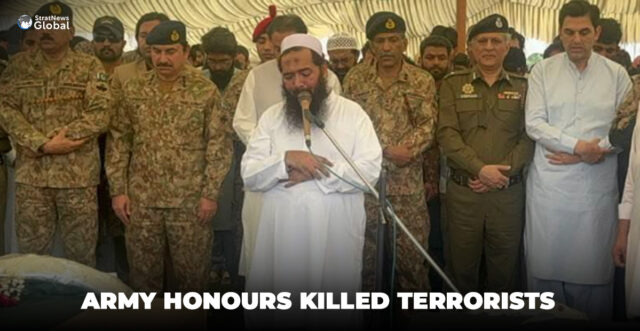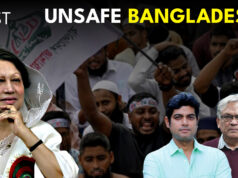In a move that underscores Pakistan’s ongoing complicity with terrorist groups, uniformed personnel of the Pakistan Army were seen participating in the funeral of three terrorists eliminated during India’s precision strikes under ‘Operation Sindoor‘.
The funeral, held in Muridke—approximately 40 km from Lahore—was also attended by senior members of the proscribed group Jamaat-ud-Dawah (JuD), founded by globally designated terrorist Hafiz Saeed.
The slain terrorists—Qari Abdul Malik, Khalid, and Mudassir—were killed when Indian forces targeted the Lashkar-e-Taiba (LeT) stronghold in Muridke, one of the nine terror hubs neutralised during the cross-border operation.
According to media reports, their funeral was held under tight security, with a significant presence of both military and civil officials, further cementing Pakistan’s role in enabling and legitimising terrorist elements.
Hafiz Abdul Rauf, a LeT operative, led the funeral prayer. The visible and official participation of Pakistan’s military and bureaucratic machinery in a public funeral for known terrorists has drawn sharp criticism, reinforcing long-standing concerns about the country’s tacit support for extremist factions.
Operation Sindoor
Operation Sindoor, launched in the early hours of May 7, was India’s calibrated response to the April 22 Pahalgam terror attack that claimed the lives of 26 men, mostly non-Muslim tourists.
The operation was carried out with surgical precision, lasting just 25 minutes, and specifically targeted terror infrastructure used by groups like Jaish-e-Mohammad (JeM), Lashkar-e-Taiba, and Hizbul Mujahideen across Pakistan and Pakistan-occupied Kashmir (PoK).
Military officials confirmed that key terrorist hubs were struck, including Markaz Taiba (LeT HQ) in Muridke, Markaz Subhan Allah (JeM base) in Bahawalpur, Mehmoona Joya Facility (Hizbul Mujahideen) in Sialkot, Markaz Ahle Hadith (LeT facility) in Barnala, and Shawai Nalla (LeT training camp) in Muzaffarabad.
The operation, executed between 1:05 am and 1:30 am, was carried out by coordinated air and ground units.
India’s Media Briefing
At a joint press briefing, Colonel Sophia Qureshi of the Indian Army’s Corps of Signals and Wing Commander Vyomika Singh of the Indian Air Force detailed the successful execution of the mission.
Foreign Secretary Vikram Misri, who also participated in the briefing, stated that the decision to strike was prompted by Pakistan’s continued inaction against terror elements operating from its territory.
Misri stressed that India’s action was in full accordance with the UN Security Council’s framework, which calls for holding accountable the perpetrators, financiers, and enablers of terrorist attacks.
He described the strike as “proportionate” and “necessary,” given the clear and present threat posed by the terror infrastructure across the border.
Shortly after the mission concluded, India’s Ministry of Defence released an official statement confirming the launch of Operation Sindoor.
The ministry emphasised that the operation was “focused, measured, and non-escalatory”, clarifying that no Pakistani military facilities were targeted.
It further highlighted India’s efforts to avoid civilian casualties, noting that great care was taken in choosing both the targets and the timing of the strikes.
(With inputs from IBNS)





